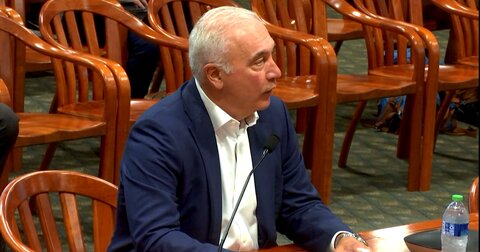DTE boss floats income-based energy bills
California’s income-based utility bills will be set within a year, and could kick in by 2025
DTE Energy CEO Jerry Norcia floated the idea of income-based energy bills while speaking to a panel of Michigan lawmakers this week.
Norcia testified for about 70 minutes Wednesday before the House Energy Committee.
Rep. Jenn Smith, D-Marquette, asked Norcia for specific policy ideas to make energy bills more affordable for low-income households.
Norcia said, with the relevant portion in bold:
So we’ve spent a lot of time thinking about this is that if we can make bills more affordable for low income customers and tie it somehow to their percentage of income, if you will, that could go a long way to I would say fundamentally resolving this issue in the state of Michigan.
Income-based energy bills are the law of the land in California, and soon to be a reality.
As The Daily Mail reports:
Last year, the state passed a law giving the California public utilities commission a 1 July 2024 deadline to determine a fixed charge for household electric bills based on people’s income.
The new income-based electricity bills could hit residents’ mailboxes as soon as 2025. Based on proposals currently under consideration, residents who make more than $180,000 a year could pay about $500 more annually on their electricity bills, while Californians who make less than $28,000 annually could save up to $300 a year.
Norcia continued: “I think if we can tie energy assistance to how much people make I think it could be a really fundamental opportunity for us to change the future of our customers, low income customers in this state (toward) continued energy efficiency.”
Norcia added that many low-income customers live in the least energy-efficient housing, and some benefits could be found by upgrades at those facilities.
Consumption is another factor, Norcia said.
“How do we move together and bring all the resources available, both federally, state and from the utilities who have energy efficiency funding, to drive at the root cause, which is helping low-income customers consume less energy?”
Michigan Capitol Confidential is the news source produced by the Mackinac Center for Public Policy. Michigan Capitol Confidential reports with a free-market news perspective.


 Nessel backs California-style consumer enforcement in Michigan bill
Nessel backs California-style consumer enforcement in Michigan bill
 18,300 Michigan households could pay more under proposed education tax hike
18,300 Michigan households could pay more under proposed education tax hike
 From $14M to $7.7M: Michigan reports major drop in food stamp fraud
From $14M to $7.7M: Michigan reports major drop in food stamp fraud